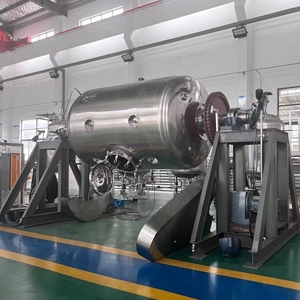A solid-state fermenter (SSF) is a specialized bioreactor designed for the cultivation of microorganisms on solid substrates with minimal free water, offering a range of critical functions. SSFs effectively handle and uniformly inoculate solid substrates, such as agricultural residues and industrial by-products, ensuring consistent microbial growth. They provide precise environmental control, including temperature regulation, moisture control, and aeration systems, to maintain optimal conditions for microbial metabolism. Some SSFs are equipped with agitation mechanisms to ensure even distribution of the substrate and microorganisms, preventing clumping and channeling. Additionally, SSFs feature sensors and control systems to monitor key parameters like temperature, humidity, pH, and oxygen levels, and can automatically adjust conditions based on real-time data to optimize the fermentation process. For product recovery, SSFs are designed to facilitate efficient collection of final products, such as enzymes and bioactive compounds, while minimizing contamination risks. The flexible design of SSFs allows for scalability, making them suitable for both small-scale laboratory research and large-scale industrial production. Their low energy consumption and sustainable operation, utilizing waste materials and requiring less water and energy, make SSFs an environmentally friendly fermentation method. Widely used in industries such as food and beverage, pharmaceuticals, agriculture, and biofuels, SSFs are essential for producing high-value products like enzymes, antibiotics, organic acids, and biofertilizers. In summary, solid-state fermenters provide precise environmental control and efficient microbial cultivation, making them an indispensable tool in modern biotechnology.
A solid-state fermenter (SSF) operates by cultivating microorganisms on solid substrates with minimal free water. The process begins with the preparation and inoculation of the solid substrate, such as agricultural residues or industrial by-products, with the desired microorganisms. The fermenter maintains optimal environmental conditions through precise control of temperature, moisture, and aeration. Some SSFs include agitation mechanisms to ensure even distribution of the substrate and microorganisms. Sensors monitor key parameters like temperature, humidity, and oxygen levels, allowing for real-time adjustments. The fermentation process results in the production of valuable products, which are then efficiently harvested with minimal contamination risk.

 English
English français
français Español
Español русский
русский português
português العربية
العربية




